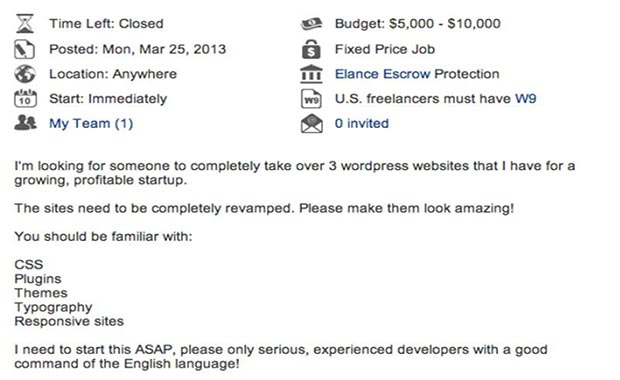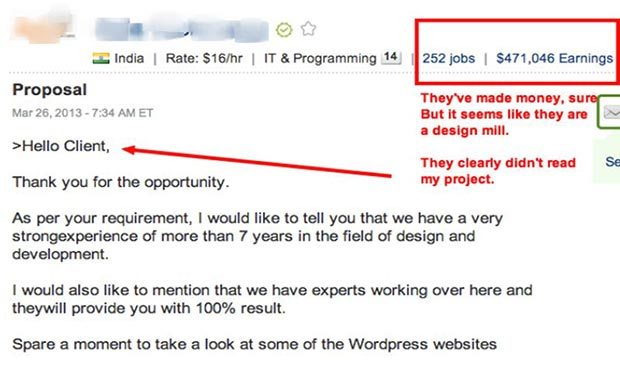Entrepreneurs
How To Make $24,000 In 4 Weeks Freelancing Online

If you had to make an extra $100 this week, could you do it? Most people would probably say yes.
But what about an extra $1,000? Hmm…now that’s quite a bit harder. Most of us might have a difficult time getting that amount of money together at a moment’s notice.
How about an extra $5,000? If you had an emergency, could you pull together a spare $5k for an unplanned expense? For 99.9% of the population, the answer is a resounding “Hell No!”
But it doesn’t have to be that way.
In today’s article, I’m going to show you the step-by-step process I used to make almost $24,000 in a single month — that’s just about $6,000/week.
I didn’t borrow the money from a rich uncle or do weird, illegal things to get it. I simply used skills I already had to pitch myself and start a freelance business.
I’ll break down exactly how I did it below — and if this article helps you, read to the end, where I’ve created a free bonus full of advanced material + strategies.
“Sell yourself first, if you want to sell anything.” – Burt Lancaster
When people ask me what the best ways to make money are, sometimes I laugh. Not because the question is stupid, but because, well, there really is no “right” answer. The truth is that almost anything can make money. But first, you have to change your mindset.
You must start viewing your skills and experiences as bankable, valuable resources worth paying for. You (yes, you) can help someone with skills and knowledge that you already have. The easiest way to do this is by freelancing. (If you’re struggling to think of valuable skills, here are some ideas and specific examples.)
All that being said … I have good news and bad news for you.
The good news: There are several online freelance marketplaces like Elance and oDesk that allow you to offer your services, get clients, and start making money quickly, even if you’re a complete beginner.
The bad news: These freelance marketplaces can be extremely competitive and overwhelming. If you don’t know what you’re doing, the competition can be very intimidating.
But don’t let that discourage you.
Today, I’m going to show you the simple “hack” I used to make $24,000 on Elance in four weeks designing simple WordPress websites. (Note: the strategies here apply for any freelance skill, not just web design.)
If you stick around until the end, I’ll also give you some tools to help you get an even bigger jump on the competition.
Step 1: Use sneaky research on your competition
Before you start, you’ll need to know what exactly you’re getting yourself into.
Specifically, you need to know:
- Exactly what strategies your successful competitors use to stand out in the crowd
- How you can completely obliterate them by being ridiculously over-prepared
To find the answers to these questions for myself, I posted a fake job to see what types of responses I would get. I recommend you do the same!
Here’s what I posted on Elance:

One note here: It’s not really necessary for you to post a fake job like I did in order to get good results. The big idea here is to show you what happens when you actually test your process and then act on those results.
Here’s what I learned with the results from my test …
Step 2: Analyzing the results
Within 30 minutes, I received almost 100 proposals — and I learned two very valuable insights:
- Over half of the applicants to my job were non-native English speakers.
- Most people were submitting “canned” proposals without any personalization.
Once I figured these critical pieces of info out, I knew I had a unique angle. Why?
Well, most people hiring freelancers are from the US/UK — which means that oftentimes, there’s a language barrier. People are always more comfortable communicating in their native language.
And because of this language barrier, most proposals were very dry and uninteresting.
Here’s one that I received …

You can do much better. Here’s how …
Step 3: How to stand out and start booking jobs
To stand out against a sea of freelancers, you have to show that you understand your potential client and provide them with a reason to give your proposal a second look. Your approach should feel warm, engaging, and above all, personalized.
Nobody wants to feel like they’re #573 for the day.
Research your prospective client’s profile beforehand and look for these details:
- Purchase history — Do they regularly hire on Elance? If so, this is a good sign that they are serious.
- Feedback history — What type of feedback do they have for freelancers they’ve hired in the past. What have they liked/disliked?
- Personal details — Name, interests, location, etc. Anything you might be able to relate to and build some rapport.
“Why fit in when you were born to stand out.” – Dr. Seuss
The knockout punch: video “mini-pitches”
Once you’ve rounded up all this information, use it to create a short “mini-pitch” with an unlisted YouTube video.
Your “mini-pitch” should:
- Be 90 seconds or less
- Introduce youself and give a very brief background
- Tell them why you like their specific project (so they know you actually read it)
- Offer a simple “call to action” to get in touch with you
Bonus: if you can include some relevant personal details that you have in common, it helps.
From there, the process is simple. Rather than sending a regular proposal like everyone else, just send them a quick message with a link to your custom video.
This method works SHOCKINGLY well because it differentiates you from the crowd and shows that you truly care about what they’re working on.
You can’t fake that.

Get the step-by-step strategies, videos and scripts I used to make $24,000 in 4 weeks
At this point, you’re probably wondering what this approach actually looks like in REAL life.
I put together an extended guide on “Hacking Elance” that includes:
- The exact scripts and screenshots I used to book jobs and negotiate with clients
- Real “mini-pitch” videos I sent that resulted in thousands of dollars
- The biggest mistakes people make when trying this approach (and how you can avoid them)
- A checklist for dealing with common client objections
Business
Scaling a Business? Here’s What Usually Goes Wrong
Before you hire, expand, or chase bigger revenue, here’s what every founder needs to fix to scale without losing control, culture, or quality.

Growing a business is the dream. But scaling one? Honestly, that is a completely different reality. (more…)
Business
Why Most Financial Plans Fall Apart (And How to Fix It)
Most financial plans fail due to poor risk management, lack of strategy, and emotional decisions – here’s how structured advisory keeps you on track.

Advisory services are redefined into a mandate for individuals and corporates seeking enhanced financial planning capabilities. (more…)
Business
How Business Owners Can Digitally Transform Their Foundation
Business owners managing foundations can use digital systems to automate admin, strengthen donor trust, and scale impact without adding more staff.

Digital transformation affects foundations as organizations just as much. These days, many foundations rely on digital tools for efficient management of their operations. (more…)
Business
How to Evaluate Stocks Like a Pro (Even If You’re Just Starting)
Before you buy your next stock, make sure you understand the 10 essential metrics that reveal whether a company is truly worth your money.

Investing in stocks can be a highly rewarding venture, but it also comes with its challenges. One of the most crucial aspects of successful investing is understanding how to evaluate stocks properly. (more…)
-

 Business4 weeks ago
Business4 weeks agoWhy Entrepreneurs Should Care About AI Automation Testing
-

 Business4 weeks ago
Business4 weeks agoWhat Every Business Owner Should Know Before Investing in API Integration
-

 Business4 weeks ago
Business4 weeks agoWhy Smart Entrepreneurs Are Quietly Buying Gold and Silver
-

 Business3 weeks ago
Business3 weeks agoHow Smart Brands Use Instagram Data to Outperform Competitors
-

 Business3 weeks ago
Business3 weeks agoThe Paradox of Modern Work: Can Tech Make Us More Human?
-

 Change Your Mindset2 weeks ago
Change Your Mindset2 weeks agoThe Hidden Reason You Can’t Stay Consistent
-

 Entrepreneurs2 weeks ago
Entrepreneurs2 weeks agoThe Six Pillars That Ground Purpose-Driven Leadership (The Berenyi Life Blueprint)
-

 Change Your Mindset2 weeks ago
Change Your Mindset2 weeks agoThe Real Psychology Behind Quitting Too Soon





























6 Comments